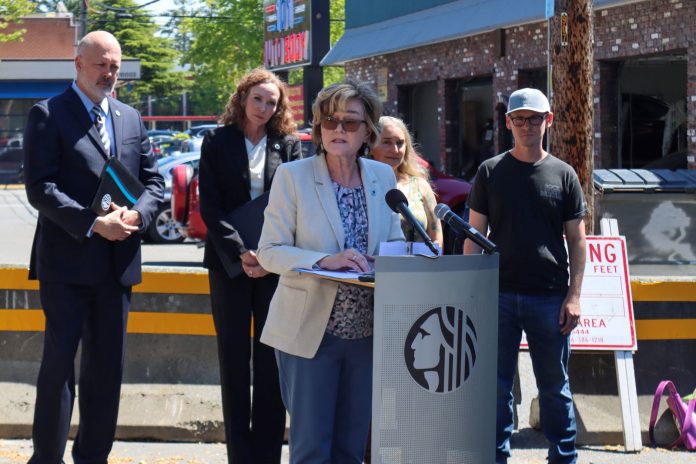
Councilmember Cathy Moore announced her resignation today, effective July 7, marking yet another shakeup for a Seattle City Council already going through a tumultuous period. Moore has represented Seattle’s northernmost District 5 since winning by landslide margin in 2023, coming into office in a wave centrist year.
Moore pointed to “health and personal reasons” as motivating her decision to resign. But her announcement comes on the heels a series of setbacks in Moore’s preferred policy areas. Most recently, Moore had to table her bill weakening City ethics rules after finding lukewarm support among her colleagues.
“My decision to leave the City Council is one I’ve been considering seriously over the past several months due to some recent health challenges. Ultimately, I believe that District 5 community members deserve a representative who can give their full attention to the critical issues facing the City and its neighborhoods,” Moore said in a prepared statement. “I’m incredibly proud of the achievements of this Council and my team during the last year and a half. Having been elected to focus on improving public safety, and tackle housing and homelessness with a progressive framework, I believe we’ve made major strides in all these important areas.”
Moore’s July 7 departure will queue up a 16-month term for the replacement that a majority of city council appoints. D5 voters will elect a replacement to a one-year term in 2026. In 2027, D5 would again be on the ballot with the rest of the districted city council seats.
Moore has previously complained about the criticism and public vitriol she has received as an elected official, bristling at constituents who loudly dissent during public comment sessions that typically open city council meetings.
“Our physical safety is being threatened by the actions of the demonstrators outside, banging on the windows, which could easily get broken and we will have a mob scene. I’m asking for police presence to arrest those individuals,” Moore said during one of her first city council meetings on in February of last year.
Even in policy areas where Moore and her centrist allies point to successes, new legislation has not been as effective as promised. For example, the banishment zone legislation that Moore pushed as a way to reduce public drug consumption and prostitution has been very seldom used in practice.
Moore’s controversial housing stances
Moore has called for revisions to Mayor Bruce Harrell’s 20-year growth plan, pushing to reduce new opportunities for apartments and pull neighborhoods like Maple Leaf (near her own residence) out of the growth centers plan, citing local push back and a desire for greater affordability mandates and tree protections, which often act as poison pills for development.

Moore had run as a pro-housing candidate and a mainstream Democrat, but quickly pivoted into a conservative streak on some issues. On the campaign trail, including in her Urbanist interview and a housing-focused forum, Moore portrayed herself as supporting housing density and the boldest housing growth plans on the table — Alternative 5 — but that’s not how she has acted once in office.
“To be honest, I would say for a while I was really reluctant to consider additional options besides single family housing, and this has been a real journey of education,” Moore told The Urbanist in 2023. “So, I’ve really moved away from that, and I’ve also been really glad that the state pushed us.”
In 2025, Moore has been singing a different tune. With townhomes too expensive for her taste and apartments apparently too unstable, she’s moved back to single family homes as the solution, it seems.
“Allowing free-range zoning is not going to get you into the home that you want,” Moore said in January as the council kicked off its Comprehensive Plan process. “It’s not going to create the ownership opportunity that you need to grow your wealth to have create a stable society where people are engaged socially and politically. What we’re talking about is building high-end townhouses and lots of rentals. Rentals are not stable.”
Other progressive leaders have criticized CM Moore for her flip-flops on housing policy, saying she "lied" on the campaign trail. bsky.app/profile/fuse…
— The Urbanist (@theurbanist.org) June 2, 2025 at 3:16 PM
[image or embed]
In that same rant, Moore rebuked urbanists and homebuilders for their advocacy for more housing, which she claimed sold false hope.
“So, we also need to challenge this statement that density is going to produce what people are seeking,” Moore said. “When I talk to young people, they want a place of their own. They want a little garden. They want the amenities that us current homeowners have, and we’re creating a false promise with what we’re putting out here and what the urbanist people are telling us, and what the homebuilding association is telling us, and even some of the affordable housing providers, who desperately need more affordable housing and have had to — because of the structure of the Mandatory Housing Affordability act — have had to try to have allegiance to them.”
Moore’s departure means the appointee that replaces her will cast key votes on the One Seattle Comprehensive Plan, which had been delayed by homeowner-funded legal appeals and indecision in the Harrell Administration. The council resorted to passing an interim ordinance to beat the state deadline to allow middle housing (such as fourplexes) throughout the city. That interim legislation will last no longer than a year without further legislative action, queuing up a big lift for Moore’s successor to take on.
In addition to passing permanent middle housing legislation, Council will also have to pass the rest of the One Seattle Comprehensive plan over the course of the next year and turn the land use plan into zoning legislation. In a move the Mayor’s Office has said was calibrated to the response they received from councilmembers, Harrell has already chopped dozens of blocks off 15 of the plan’s “neighborhood centers”, where new midrise apartment buildings with neighborhood retail opportunities were to be focused.
Perhaps with Moore gone, Harrell and the remaining councilmembers may think about going in the other direction.
The process to replace Moore
The City Charter gives the city council 20 calendar days to fill a vacant Council position. The press release from the city Council pledged an announcement soon on the details on the vacancy process for District 5, which will need to conclude in late July to comply with the charter. Typically, Council puts out a call for applications and each councilmember forwards one applicant for the final pool — sometimes with public forums along the way.
The fact the appointee will get to serve a 16-month term has sparked criticism from some Democratic Party leaders, including former 43rd Democrats chair Scott Alspach. A resignation timed before the mid-May filing deadline would have meant voters could have weighed in on Moore’s replacement in the election this November.
“[A]sk Moore why she waited until after filing week to resign and denied her constituents the opportunity to have an elected representative for an entire additional year,” Alspach said in a Bluesky post. “Scandalous behavior from an elected official!”
In January, Council finished with an another appointment process to replace Tammy Morales, who resigned at the start of 2025. In that process, a majority of city council choose Mark Solomon, who ran against Morales in 2019.
Former D5 candidate Nilu Jenks says she's planning to put her name in the running to replace Cathy Moore on the Seattle City Council, after Moore announced today she'll be resigning her seat in early July.
— Ryan Packer (@typewriteralley.bsky.social) June 2, 2025 at 4:31 PM
[image or embed]
While appointing a runner-up worked for Council in the past, in Moore’s case, the two candidates behind her in the 2023 primary were both progressives — ChrisTiana ObeySumner and Nilu Jenks, who The Urbanist Elections Committee (on which I serve) endorsed. This ideological difference makes it seem unlikely the centrist majority will select either of these runner-ups. Nonetheless, Jenks has already announced her intention to apply for the appointment.
In appointing Solomon, the Sara Nelson-led centrist majority replaced a progressive with a fellow centrist.
However, a comfortable majority has not meant smooth sailing for the Nelson-led centrists, who face record low approval ratings and limited success passing major legislation. At the rate they’re going, Moore may be the first out the door, but more departures, voluntary or not, could well be on the horizon.
Doug Trumm is publisher of The Urbanist. An Urbanist writer since 2015, he dreams of pedestrian streets, bus lanes, and a mass-timber building spree to end our housing crisis. He graduated from the Evans School of Public Policy and Governance at the University of Washington in 2019. He lives in Seattle's Fremont neighborhood and loves to explore the city by foot and by bike.

